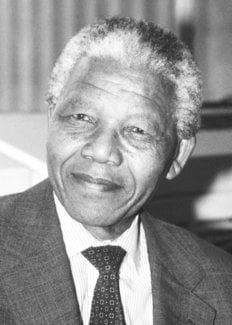Nelson Mandela
Biographical
Questions and answers on Nelson Mandela

Nelson Rolihlahla Mandela was born in Transkei, South Africa on July 18, 1918. His father was Hendry Mphakanyiswa of the Tembu Tribe. Mandela himself was educated at University College of Fort Hare and the University of Witwatersrand where he studied law. He joined the African National Congress in 1944 and was engaged in resistance against the ruling National Party’s apartheid policies after 1948. He went on trial for treason in 1956-1961 and was acquitted in 1961.
After the banning of the ANC in 1960, Nelson Mandela argued for the setting up of a military wing within the ANC. In June 1961, the ANC executive considered his proposal on the use of violent tactics and agreed that those members who wished to involve themselves in Mandela’s campaign would not be stopped from doing so by the ANC. This led to the formation of Umkhonto we Sizwe. Mandela was arrested in 1962 and sentenced to five years’ imprisonment with hard labour. In 1963, when many fellow leaders of the ANC and the Umkhonto we Sizwe were arrested, Mandela was brought to stand trial with them for plotting to overthrow the government by violence. His statement from the dock received considerable international publicity. On June 12, 1964, eight of the accused, including Mandela, were sentenced to life imprisonment. From 1964 to 1982, he was incarcerated at Robben Island Prison, off Cape Town; thereafter, he was at Pollsmoor Prison, nearby on the mainland.
During his years in prison, Nelson Mandela’s reputation grew steadily. He was widely accepted as the most significant black leader in South Africa and became a potent symbol of resistance as the anti-apartheid movement gathered strength. He consistently refused to compromise his political position to obtain his freedom.
Nelson Mandela was released on February 11, 1990. After his release, he plunged himself wholeheartedly into his life’s work, striving to attain the goals he and others had set out almost four decades earlier. In 1991, at the first national conference of the ANC held inside South Africa after the organization had been banned in 1960, Mandela was elected President of the ANC while his lifelong friend and colleague, Oliver Tambo, became the organisation’s National Chairperson.
This autobiography/biography was written at the time of the award and later published in the book series Les Prix Nobel/ Nobel Lectures/The Nobel Prizes. The information is sometimes updated with an addendum submitted by the Laureate.
Watch a video clip of Nelson Mandela and Frederik Willem de Klerk receiving their Nobel Peace Prize medals and diplomas during the Nobel Peace Prize Award Ceremony at the Oslo City Hall in Norway, 10 December 1993.
| Selected Bibliography |
| By Mandela |
| Mandela, Nelson. Nelson Mandela Speaks: Forging a Democratic, Nonracial South Africa. New York: Pathfinder, 1993. |
| Mandela, Nelson. Long Walk to Freedom. The Autobiography of Nelson Mandela. Boston & New York: Little Brown, 1994. |
| Mandela, Nelson. The Struggle Is My Life. New York: Revised, Pathfinder, 1986. Originally published as a tribute on his 60th birthday in 1978. Speeches, writings, historical accounts, contributions by fellow prisoners. |
| Other Sources |
| Benson, Mary. Nelson Mandela, the Man and the Movement. Harmondsworth: Penguin, 1994. Updated from 1986 edition. Based on interviews by a friend of Mandela since the 1950s. |
| de Klerk, Willem. F. W. de Klerk: The Man in His Time. Johannesburg: Jonathan Ball, 1991. By his brother. |
| Gilbey, Emma. The Lady. The Life and Times of Winnie Mandela. London: Cape, 1993. Most comprehensive biography. |
| Harrison, Nancy. Winnie Mandela: Mother of a Nation. London: Gollancz, 1985. Authorised favourable biography. |
| Johns, Sheridan and R. Hunt Davis, Jr., eds. Mandela, Tambo and the ANC: The Struggle Against Apartheid. New York: Oxford University Press, 1991. Documentary survey. |
| Mandela, Winnie. Part of My Soul. NY & London: Norton, 1984. Edited by Anne Benjamin and Mary Benson. |
| Meer, Fatima. Higher Than Hope: The Authorized Biography of Nelson Mandela. NY: Harper, 1990. By family friend, with Mandela’s corrections. Foreword by Winnie Mandela. |
| M Meredith, Martin. Nelson Mandela. A Biography. New York: St, Martin’s, 1998. By an authority on South Africa. Recommended reading. |
| Ottaway, David. Chained Together. Mandela de Klerk, and the Struggle to Remake South Africa. New York: Times Books, 1993. Critical treatment by well-informed journalist. |
| Sparks, Allister. Tomorrow Is Another Country: The Inside Story of South Africa’s Road to Change. New York: Hill & Wang, 1995. By a distinguished South African journalist. |
| Waldmeir, Patti. Anatomy of a Miracle: The End of Apartheid and the Birth of a New South Africa. London: Viking, 1997. |
This autobiography/biography was written at the time of the award and first published in the book series Les Prix Nobel. It was later edited and republished in Nobel Lectures. To cite this document, always state the source as shown above.
For more updated biographical information, see:
Mandela, Nelson. Long Walk to Freedom: The Autobiography of Nelson Mandela. Little, Brown and Co., Boston, 1994.
Nelson Mandela died on 5 December 2013.
Nobel Prizes and laureates
Six prizes were awarded for achievements that have conferred the greatest benefit to humankind. The 14 laureates' work and discoveries range from quantum tunnelling to promoting democratic rights.
See them all presented here.
